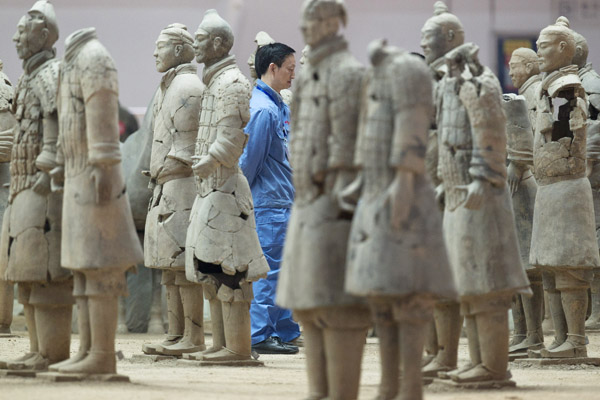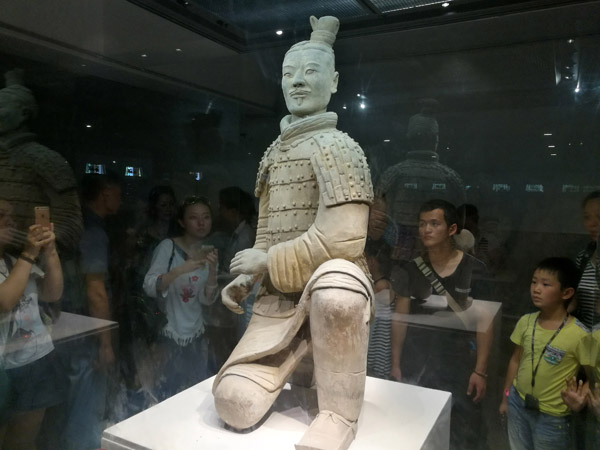BBC documentary claims Western contact with China came much earlier
Updated: 2016-10-13 17:04
By EARLE GALE(China Daily UK)
|
|||||||||
 |
|
A museum worker stands among partially pieced together Terracotta Warriors in Qin Shi Huang Terracotta Warriors and Horses Museum in Xi'an, Shaanxi province. [ALEXANDER F.YUAN/AP] |
A new BBC documentary that will air in the UK and the United States on Sunday claims the famed Terracotta Warriors found within the tomb of China's first emperor near today's city of Xi'an may have had their genesis in Ancient Greece.
The Greatest Tomb on Earth: Secrets of Ancient China puts forward the theory that China and the West were in contact far earlier than previously thought – some 1,500 years before European explorer Marco Polo arrived in China in the 13th century.
The documentary includes input from archaeologists who claim the inspiration for the 8,000 buried Terracotta Warriors discovered in the tomb in 1974 came from Ancient Greece and that Greek artisans may even have trained Chinese craftsmen in the 3rd century BC.
"We now have evidence that close contact existed between the First Emperor's China and the West before the formal opening of the Silk Road. This is far earlier than we formerly thought," senior archaeologist Li Xiuzhen, from the Emperor Qin Shi Huang's Mausoleum Site Museum, told the BBC. At the same time, another study claims to have found European-specific mitochondrial DNA in ancient sites within China's Xinjiang Uygur autonomous region, which suggests Westerners may have settled there before the time of the First Emperor.
In the documentary, the archaeologists point out that there was no tradition of building life-sized human statues in China before the creation of the tomb of Emperor Qin Shi Huang in 210-209 BC.
Li believes the inspiration for the radically different statues likely came from outside China.
"We now think the Terracotta Army, the Acrobats and the bronze sculptures found on site were inspired by ancient Greek sculptures and art," she told the broad caster.
 |
|
[Photo/China Daily] |
Lukas Nickel from the University of Vienna told the BBC the statues of circus acrobats found in the tomb support the theory, with the First Emperor possibly influenced by the arrival of Greek statues in Central Asia during the century following Alexander the Great, who died in 323 BC.
The documentary also reveals that the tomb site in
Xi'an is likely far larger than first thought and may be 200 times the size of Egypt's Valley of the Kings. Experts believe it has many more secrets to give up.
Emperor Qin Shi Huang is a towering figure in Chinese history who united warring kingdoms and shaped them into one country. He also started construction of the Great Wall.
Zhang Weixing, the lead archaeologist at the tomb site, is quoted in the Daily Telegraph as saying the recent findings eclipse the tomb's initial discovery.
"The archaeological work undertaken here recently is more important than anything in the past 40 years," Zhang said. "By systematically examining the First Emperor's main tomb and subsidiary burials, we have discovered something more important even than the Terracotta Army."
Other findings believed to have been made at the site include the discovery of the mutilated bones of young women who were believed to have been high-ranking concubines buried with the emperor, and the skull of a young man believed to have been Prince Fu Su, the First Emperor's eldest son. It was found with a crossbow bolt embedded in it.
The Greatest Tomb on Earth is a one-hour special hosted by Dan Snow, Alice Roberts and Albert Lin. It will air on BBC Two in the UK on Sunday at 8 pm and in the US on the National Geographic channel.
Related Stories
Qinshihuang's Terracotta Warriors may be inspired by Greece 2016-10-13 11:43
Did Greece inspire China's first emperor's Terracotta Warriors? 2016-10-13 11:43
China's terracotta warriors exhibited at Chicago's Field Museum 2016-03-03 11:24
Terracotta Warriors to revisit Chicago 2015-11-25 11:37
Today's Top News
Chinese president arrives in Cambodia for state visit
Q3 trade growth rebounds, pressure remains
Chinese shop big in London's West End
China-Russia joint missile defense drill set for 2017
Snowden appeals extradition lawsuit
Samsung may permanently halt Galaxy Note 7 sales
Turkey, Russia sign deal on natural gas project
Trump goes on offensive, but Clinton more eloquent
Hot Topics
Lunar probe , China growth forecasts, Emission rules get tougher, China seen through 'colored lens', International board,
Editor's Picks

|

|

|

|

|

|







